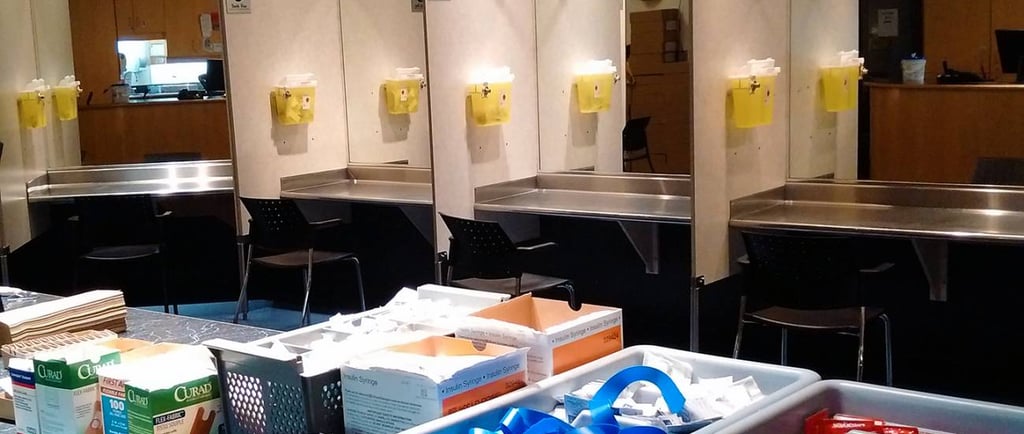Ontario’s Supervised Consumption Site Closures: A Public Health Crisis in the Making
Ontario’s decision to close supervised consumption sites (SCS) threatens public health by removing vital harm reduction services during the opioid crisis. The government’s shift to abstinence-based treatment may exacerbate the crisis and disproportionately harm vulnerable communities.
Katherine Al Zanoun
5/10/20253 min read


In December 2024, the Ontario government passed legislation that initially forced the closure of 10 supervised consumption sites (SCS) across the province by March 31, 2025. These closures have dismantled one of the most effective public health responses to the province’s worsening opioid crisis.
Supervised consumption sites are regulated clinical spaces where people can safely consume/take drugs under the watchful eye of trained health professionals. These sites do more than prevent overdose deaths—they also reduce the spread of communicable diseases, connect people with treatment and detox services, and offer pathways to care for some of Ontario’s most vulnerable. Between March 2020 and May 2024, staff at Ontario’s SCS reversed nearly 22,000 overdoses. In that same period, more than 1.12 million visits were recorded, with over half a million referrals made to additional health and social services.
Despite overwhelming evidence, the provincial government passed Bill 223—the Safer Streets, Stronger Communities Act—without public consultation or input from health professionals, people with lived experience, or harm reduction organizations. The bill prohibits SCS from operating within 200 metres of schools, daycares, and child and family centres, resulting in 10 closures across key regions including Toronto, Ottawa, Hamilton, Guelph, Kitchener, and Thunder Bay. Nearly half of Ontario’s 23 SCS are at risk (1).
The impacts of these closures will be devastating. Data from the threatened sites shows that in 2022–2023 alone, staff successfully reversed over 1,500 overdoses—without a single death on site. In northern Ontario, Thunder Bay’s SCS is the only one serving the region, making its closure particularly catastrophic.
Ontario is in the grips of a public health emergency. Between 2016 and 2023, 26,673 people in the province died of opioid or stimulant-related overdoses, more than the total number of Ontarians who died during the COVID-19 pandemic. In 2023, the province saw a 200% increase in opioid-related deaths since 2016. Toronto alone lost 528 residents to overdose in 2023—a 75% increase from 2019 (2).
Communities across Ontario are suffering, with First Nations, Black, low-income, and unhoused individuals bearing the brunt. Youth deaths from opioids are also rising. Structural inequalities—poverty, racism, colonialism, and lack of access to healthcare—make this crisis even more deadly.
In response, the government plans to replace harm reduction services with 27 abstinence-only “HART Hubs” (Homeless and Addiction Recovery Treatment), banning supervised consumption, safer supply, and needle exchange programs. While investments in detox, treatment, and housing are essential, removing harm reduction from the equation undermines public health. Addiction is a complex, chronic disease; recovery is not a one-size-fits-all journey. Denying people access to lifesaving interventions increases the risk of death, disease, and further marginalization.
The decision to shutter SCS contradicts the government's own internal evidence. A 2018 Ontario Ministry of Health report acknowledged that supervised consumption services reduce deaths, connect people to care, save money, and do not increase crime. In fact, a recent study found homicide rates decreased in areas near SCS, while other neighbourhoods saw increases. Toronto police data show similar trends in assault and robbery.
Furthermore, internal government documents obtained through freedom of information requests warn that the closures could violate the Canadian Charter of Rights and Freedoms. A constitutional challenge is already underway, led by two SCS service users and the Toronto Neighbourhood Group Community Services. They argue the legislation infringes on the right to life, liberty, and security of the person, and disproportionately harms Indigenous and racialized communities.
Public health experts, civil liberties advocates, Indigenous organizations, and community leaders agree: the closure of supervised consumption sites will have dire consequences. As Katie Resendes, a service user and plaintiff in the Charter case, puts it: “Those of us that use the sites do not have a death wish as some may think. Please be aware of the devastation that will occur” (3).
The Ontario government’s decision to close supervised consumption sites (SCS) represents a significant shift in the province's approach to addressing the opioid crisis. Despite strong evidence supporting the effectiveness of these sites in saving lives, connecting individuals to care, and reducing public health risks, the government’s new policy prioritizes abstinence-based programs over harm reduction strategies. This decision not only contradicts existing research and internal reports but also raises serious concerns about the long-term impact on vulnerable communities, particularly Indigenous, racialized, and low-income populations. While addressing addiction through a comprehensive approach that includes treatment, detox, and housing is vital, the removal of harm reduction services could exacerbate the crisis, increasing the risk of overdose deaths and further marginalizing those who rely on these critical services. The ongoing legal challenge and opposition from health professionals and community groups highlight the need for a more balanced and inclusive public health response to this urgent issue.
